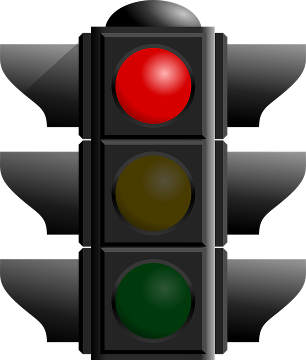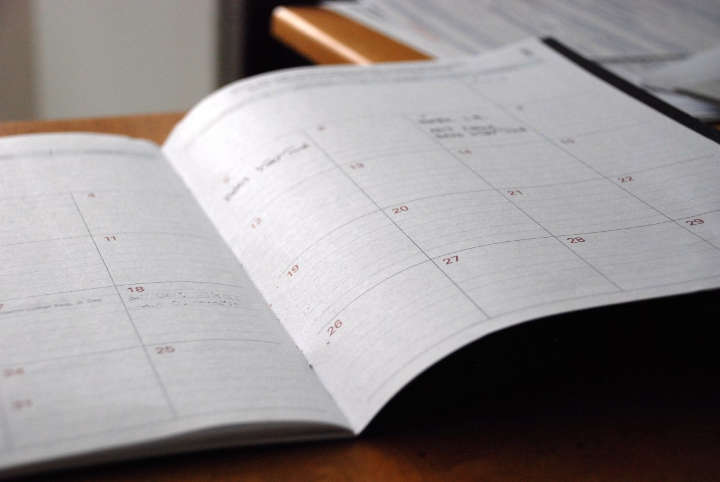Let’s rewind to your morning today. Did you wake up with purpose, knowing exactly what to do for the next six hours? Or did you open your eyes with your brain all clouded, knowing that you have zillions of things to do, but with no idea about where and how to start? In this confused state, it is very easy to pick activities that need very little effort. For instance, snooze the alarm & stay back in bed. It is very easy to cling to activities that make your brain feel busy, but you aren’t doing anything productive. For instance, reading the newspaper all morning, browsing your email or watching TV.
The truth is that your mind is facing an overwhelming question. Figuring out and prioritising your tasks for the day. Of all the tasks I have, which ones should I do today and with which one should I start? However, humans are bad at facing overwhelming tasks without a plan and the next step. The brain tries to bury itself in activities that look useful, but are simply a comfort. An escape.
How can we wake up every day and intentionally take steps towards our goals instead of whiling away our time in idleness or unimportant activities? A very good method to do this is to start the previous evening. A good hour spent planning for the next day is essential to boost your confidence. I have been doing this since the start of 2017, also managing to carry the habit in patches during our trip India 360. It has worked wonders. In this post, I will tell you about the benefits I am reaping. I will also let you know some best practices for the habit so that you use them the right way.
Benefits of planning for the next day

Better sleep at night: A good planning session takes a lot of weight off your shoulders. Often, you are in a less than ideal situation today and have several problematic tasks to face tomorrow. But writing down a day plan and knowing that the problems will be tackled at a certain hour the next day soothes you. It lets you take a deep breath and go to a fitful sleep.
Less confusion: The biggest impediment to getting started on a day is the confusion about where to start. Psychologists call this decision fatigue. Your brain can only make a certain number of decisions a day before it runs out of steam. Another problem is that, if your brain is given more than 5 – 7 choices, it feels paralysed. Try standing in front of a food kiosk with 70 items and you will mostly be tempted to walk away rather than make a choice.
By subjecting your brain to a staggering array of choices about what to do on a day, you are setting yourself up for inactivity. Planning for your day in advance on the previous evening leads you into the next day, with you already having made a decision about where to start and what to do.
Less distraction: A list of 3 – 5 activities for the day, coupled with a time-table for them is a magic potion against the evils of distraction. Since you have predetermined things to do, it is less likely that you will revert to your idling activities such as checking mails, Facebook or gossip.
Less procrastination: Making a list of things to do and putting a day and time to each of them is a commitment. It is a commitment to yourself. Very few people can wilfully cheat on a commitment made to themselves. Procrastination happens due to a lack of commitment. In the presence of one, you will stand behind yourself and take action.
Problem has been broken into small steps: Writing a thesis or running a marathon can be overwhelming. But if what you have put down on your list for tomorrow is, ‘Write 2 pages of prologue for thesis’ or ‘Run 2 km in 20 minutes’, then you have broken your project into actionable baby steps. It is mostly likely that you will follow up.
Easier to say NO to others: Armed with a fully planned set of tasks for which you are committed, it is easier for you to stop others from creeping up on your time. Short favours here and there, that seem harmless, but are unnecessary for you can be rejected. You will have a solid reason and conviction to make the one who is asking for favours understand. It’s easier to tell your friend that you can’t accompany her for shopping because goal X is keeping you busy and is important to you.

Some best practices while planning for your next day
Only schedule three big tasks for the next day: You may have a million tasks to do, but there are a few hours a day when you can work at your peak. As a thumb rule, I schedule only three big tasks (2 – 3 hours) on a single day. Writing this blog post is such as task. It can be combined with another two tasks such as working on my client’s project (3 hours) and writing one chapter for our India 360 book (3 hours). But no more. If I can complete three such tasks on a single day, I consider it a win. Read about this methodology in the post 600 minutes for your most productive day. Three sessions: 4:30 am – 7:30 am, 9:30 am – 12:30 pm and 2:30 pm to 5:30 pm are some slots I love.
Schedule some smaller tasks around the big tasks: Between your biggest and most important tasks, you can schedule some smaller tasks. For example, I have holes between 7:30 am – 9:30 am and then again from 12:30 pm to 2:30 pm. My bathing, breakfast and lunch preparation are in the morning free slot (7:30). It is in this slot that I pick up my smartphone for the first time that day. My lunch is at 12:30. Post lunch is for doing dishes and cleaning up. I do not schedule any brain work during the post-lunch free slot. For me, early afternoon is a low concentration zone, due to having woken up as early as 4:15 am. It is a good time for me to work out or run a few errands outside home.
Some tasks come daily: Along with seasonal tasks which depend on the projects you are working on, some tasks are for everyday. For me, these are preparing breakfast, lunch and dinner, reading at least 5 pages from whatever book I am currently making progress with and taking a walk outside in the evening. With our return from India 360 trip, we are restarting our workout and exercise habits. We call these lifestyle habits. They’ll seldom change as long as you are on a routine at home. Plenty of these habits go with you even when you travel.
Leave enough margins: Remember that you are not a machine and that you deserve breaks. Never schedule tasks back-to-back for several hours at a trot. Breaks, at least 5-10 minutes, are needed between scheduled tasks. Take breaths, walk around your room or on the street, call your spouse at work, flip through some old photos and have a cup of tea or coffee. Your day’s time-table is meant to guide you and bring discipline, but it cannot be so demanding that you are a slave to it.
Do not schedule leisure activities during your work hours: This discipline takes a lot of time to bring on, but do not, I repeat, DO NOT schedule leisure activities during the time you are supposed to work. For me, hours 4:30 am – 5:30 pm are strictly for work and lifestyle habits. I’d NEVER plan something like this.
7:00 am – 9:00 am: Write blog post on Tech 101
9:00 am – 11 am: First session of India v/s Australia cricket test match
11 am – 11:40 am: Review written Tech 101 blog post and publish it.
11:40 am – 1:40 pm: Second session of cricket test match
This is quite common among freelancers who work from home. Nowadays, even offices have televisions to cast live sports matches and everyone watches them, especially if a favourite team plays. So why not you?
It may break your heart to miss a live cricket or a football match, but you are on a mission to achieve your goals set by yourself, whether your personal ones or those you agreed upon with your workplace to accomplish. The first half of your day should be spent ONLY on working on your goals. Leisure time comes later. Frankly, you shouldn’t be watching live sports on TV in the first place. Why? Read about it in How to invest 30 days in yourself. If you still want to watch the match, then watch the curated highlights later at night.
Do not schedule any activity that doesn’t align with your goals: These activities are not as destructive as watching a test cricket match during your work hours, but they have the same effect — delaying the achievement of your goals. Often these tasks are due to others’s schedules & priorities. A weird example for you. Near Mumbai, where I live, a small shop sells good south Indian ground coffee beans. But the shop is open only from 8 to 12 in the morning and then from 4 to 8 in the evening. I cannot use my afternoon slump time 1:30 to 2:30 to buy coffee beans. I use a slim window after 6 pm to do so. But sometimes they run out of coffee beans by that time. Damn it! Mom told me to go in the morning itself, taking a short time away from my project and compensating for that time later in the evening.
But it doesn’t matter. I still refuse to go there between 8 am to 12 noon or before 6 pm. Why? Because buying coffee beans isn’t a priority for me. I would do that if trading & distributing coffee were an occupation for me. As a software engineer and blogger, coffee is just an avoidable stimulant and I can function without ever having coffee beans in my kitchen. No coffee today? Well, too bad. But at least I am several steps closer to my goals.
Likewise, it is okay for you to skip small family events, coffee with friends or shopping with your spouse, if you are requested to attend them during the hours you consider sacredly for your work. Your productive hours are yours to guard.
Do not schedule watching ‘live’ events: I am a software developer working with open source tools. An event like Google I/O is important for me. Watching Google I/O is not leisure. It is for learning something new for work. Unlike coffee beans, Google I/O is relevant to my work. I need to learn about new releases in Android, Angular, Google Cloud, etc.
My friend, who is an iOS developer, keeps tabs on the WWDC event. Besides, there are several seminars and webinars on software security, software automation and AI that I am most interested in. It’s just that I watch NONE of these live. Why not?
During work hours, I am interesting in doing only work that tangibly takes me towards my goals. This would mean writing code to make my software work or typing my blog post. Google I/O is a learning event, which can wait. I am okay with watching ‘stale’, recorded events. In fact, it is so easy to skip the boring parts in a recorded video instead of having to sit through it all at a live event.
Do not schedule work after 6 pm: And now comes leisure time. You have worked hard all day, not giving in to the temptations of leisure activities or live events. Now is your chance. Stop your work. Take a splash in your swimming pool. Go shopping with your spouse. Maybe now is the time for watching the highlights of your beloved cricket match. Do not be a slave to your work. And if you schedule yourself to keep working all day tomorrow, how can you find the time to schedule for day after tomorrow?
Leave the weekend for maintenance, skill-building and research: This will come as a relief. Do not schedule your regular work for weekends. Wow! Can I watch ‘Games of Thrones’ all day?
Not quite. Be lazy during your weekend for sometime, but otherwise make it different. You should give novelty a try. Eat at a place you have never eaten before. Try to learn a new language. Take a bicycle ride to a road where you have never been. Try to cook a new dish. Weekends should be for something new. To discover new sights, tastes and interests. Those that you can add as new goals or new lifestyle habits. Weekend is when you grow as a person. Weekend is when you sharpen your axe.
Use reminders: Use your phone’s calendar to remind you when you should start working and what you should work on. All the planned time slots for the day should be marked on your phone’s calendar. The phone will chime when it is time for you to start your work or when it is time to switch to a new task. Use technology as an ally. You can use Post-It notes or ask your spouse to remind you when it’s time to go to work. Set all reminders during your planning session, so that they will be ready to remind you on the day you are at work.
Conclusion
It is hard to wake up every morning and get caught in an internal argument about what you should focus on today. Be kind to yourself and set your day up on the previous evening. Your mornings will never be a tangled mess again.
If you want to read in detail about planning for your day and even your week, month and year, then you should check out the book The Pledge by Michael Masterson. We have reviewed the book in the post Book Summary: The Pledge by Michael Masterson.
